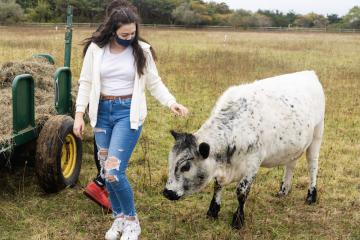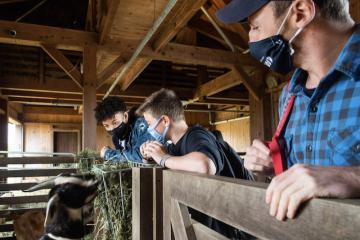On Tuesday morning, three eighth-graders from the Martha’s Vineyard Charter School kneeled over a bed of arugula in the gardens of Slough Farm, plucking broad leaves from the soil as they talked.
The morning’s gardening duties were part of the charter school’s new outdoor expeditionary learning program. For the middle schoolers, who have been taking classes remotely this fall, the soil and blooming greens became the site of their first class of the day.
The expeditionary program, launched at the start of October, is the charter’s school’s latest effort to build in-person, project-based learning into the fall curriculum. Once a week on Tuesday and Wednesdays, small groups of middle and high school students travel to Island farms and organizations for a morning of outdoor learning and community volunteering.
“We understand that remote learning on the computer has a place, but we really want to make sure that our kids are getting their hands dirty as well,” head of the charter school Peter Steedman told the Gazette by phone.
Slough Farm programming director Sophie Jones (red hat) leads charter school students on farm chores.
— Ray Ewing
For the next five weeks, the groups will rotate through lessons at the school’s partner organizations — Slough Farm, Island Grown Initiative, Felix Neck, Featherstone Center for the Arts and WMVY. After the initial rotation, students will specialize at the organization of their choosing, Mr. Steedman said.
“We’ll give students a little bit more autonomy to choose where they want to go,” he said. “But with the opportunity to work with the different Island organizations to learn about not only the Island and the environment, but also about themselves, it is a win-win for everyone.”
On Tuesday, for the second official week of the program, busloads of eager students traveled the Island for their morning activities.
At Slough farm, students worked with programming director Sophie Jones to cut the arugula, separating the bolted plants from the ripe ones and learning about the plant’s life cycle as they went. Last week, students helped the farm team cover-crop garden plants, Sophie said, and next week the kids will meet a new flock of farm chiclets.
“I really based the activities we’re doing on the actual needs of the farm,” Sophie said. “I start with the work and then I’ll take it into a lesson about soil or plant physiology or good harvesting.”
Not far away, at IGI’s Thimble Farm in Vineyard Haven, a group of students worked with staff throughout the morning to cultivate the property’s fields and plant new trees. Meanwhile, at Felix Neck Wildlife Sanctuary, students delved into habitat restoration, analyzing water samples and taking species inventory.
Other groups turned their attention to the arts with a specific focus on social justice, learning from Island storytellers about weaving themes of racial justice into poetry and prose. At Featherstone, Jennifer Smith Turner, an Island poet and author of the award-winning book Child Bride, shared the secrets of her writing process, while at WMVY, Laurel Redington and Joe Stickles led students through the fundamentals of radio journalism.
Mr. Steedman said the students plan to use their sessions with WMVY to eventually create a radio essay about the charter school’s founding in honor of its 25th anniversary this year.
With their focus on interactive learning and community engagement, the expeditionary programs dovetail with the charter school’s larger mission of alternative learning, Mr. Steedman said. The programs also align closely with the student’s day-to-day content work — whether in science, history or English class.
“If you look at our mission, it’s that we want to create an environment that models interdependence as a foundation of society,” Mr. Steedman said. “When we look at this project, it’s multi-age, it’s project-based, it’s hands-on. . . whether we’re learning about social justice or understanding the elements of processing garlic, focusing on the interdependence of all things is so key to our mission.”
Mr. Steedman is even considering incorporating the skill-building program into the general curriculum going forward, especially if the school is inducted into the International Baccalaureate program later this year.
But beyond the educational benefits, students and teachers alike have expressed their joy at being together again — even just once a week — amidst the pandemic.
“It’s great to be back in school,” said eighth-grader Scarlet Marino on Tuesday. “We’ve been stuck online for six months.”
Max Feldman, middle school advisor and learning facilitator, agreed. “Hands-on is so much more valuable than a textbook. It’s great for them to learn the value of hard work, especially in a farming community like Martha’s Vineyard.”
And with success so far, Mr. Steedman is looking forward to continuing the program into the cooler months and the years to come.
“I hope the student gain an even greater appreciation for the farmers on Island, the artists, the newsmakers,” he said. “There is an opportunity on the Island to make a real contribution artistically, environmentally, organically, and our students have a role to play in that.”
At the end of the lesson at Slough Farm, the three eighth-graders boarded the bus back to school, each with a freshly picked carrot in hand.
“See you on the next rotation,” Sophie called as they pulled away.






